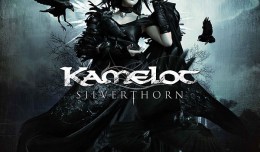Review
I tried. I really did. Even after the absolutely miserable excuse of an Opeth release that was Watershed, I tried to consider it a small blight on an otherwise monumental career for one of metal’s must innovative, enduring groups. I suppose I shouldn’t be too upset. The Swedes are simply embodying the notion that what goes up must eventually come down, I just wish that the fall would have happened with a little more grace, even dignity. Heritage, Opeth’s newest “opus” is simply laughable, a derivative, soulless excuse of a “prog” album by a group that have just forgotten who they are.
Amusingly enough, there is one fantastic piece of music on this record, and it comes in the form of the two minute title track that kicks of the proceedings, a beautifully atmospheric piano piece dripping with a kind of otherworldly emotion that is difficult to pin down, and I found myself mesmerized for a short period before reality kicked in. It’s pretty much all down hill from there. The laughable prerelease track “The Devil’s Orchard” is a prime example of the self indulgent, pseudo technical prog rock on display for the entire grueling length of the release. There are no death growls to be found, and while this is not in itself arsenic to the album’s potential (See Damnation for an example of how this can be done right), in the context of this release, they are sorely missed. On the rare occasion the music delves into the more sinister feel the band is known for, such as mid way through “I Feel the Dark,” it still seems weighed down with a sort of pretentiousness that permeates every song on display.
It is almost senseless to delve into the nitty gritty of every song because it would invariably be a redundant exercise. “Slither” is apparently a tribute to Dio, which in itself is pretty cool, but sounds like just another silly filler song in an exhausting collection of silly filler songs. “Famine,” the longest track on the album, yet about average in length in the context of the band’s musical legacy, is agonizing to sit through. Think about it: A track that is half the length of a song like “Deliverance” that seems four times as long, causing uncontrollable urges to simply nod off mid way, with the aimless, meandering noodeling of Mikael Akerfeldt leading a charge of absolute musical and emotional mediocrity. The album closes with the interestingly titled “Marrow of the Earth,” yet another flat, completely uninteresting snoozefest. If Opeth’s newest release was judged solely by the song titles, I’d give it a solid thumbs up, as there is some interesting lyrical imagery on display. Unfortunately, we all know about books and their covers.
Production wise this is a bit of a departure to suit the new direction, with a kind of dirty, echoing feel that is really quite pleasing by itself. One could easily imagine removing a well-worn vinyl from an ancient sun faded record sleeve and gently placing the needle on its surface, reveling in the occasional hiss and pop. For creating this sort of vintage atmosphere the band deserves props. It’s too bad the actual musical content can’t live up to even the most basic expectations of quality.
Songs to Watch Out For: Heritage, I guess.
The Bottom Line: Opeth have always been a group to push the boundaries of what heavy metal can be. Far from pushing boundaries, this is a huge step back, not just in the sense that it feels like a bad homage to 70’s prog-rock, but creatively. The songs are just a chore to get through, are completely devoid of that essential emotional spark that makes people connect with music. When all is said and done, this is about as much of a failure as I can imagine.
Review by Marc Garrison
















Whil I disagree with a majority of the review above, I also agree with some points. After several spins of this long awaited release, I find I am enjoying it more. At some points of this release it feels a little un-focused. I do feel that far as an Opeth release, it is somewhat disappointing and not that good an Opeth album. Once I began listening to it as “an album of music” as opposed to an “album of Opeth music” it was much easier to swallow and digest. The song “Slither”, a dedication to the late/great Ronnie James Dio sounds almost identical in arrangement to Rainbow’s Kill The King, which is obviously intentional. I Feel The Dark is my favorite track which I feel would not have been out ofvplace on Damnation or
Deliverance…The Devil’s Orchard sounds a bit like it couldcbeen on a Yes album. In conclusion, this would have been a good and interesting release if it was a Mikael Akerfeldt solo release paying homage to his prog. influences or if he had put together a prog. band similar to what Mike Portnoy did with Transatlantic with members of Spock’s Beard, Marillion & Flower Kings. It’s just not Opeth. I applaud the effort, but this album should have been saved for another project/band of Mikael Akerfeldt.